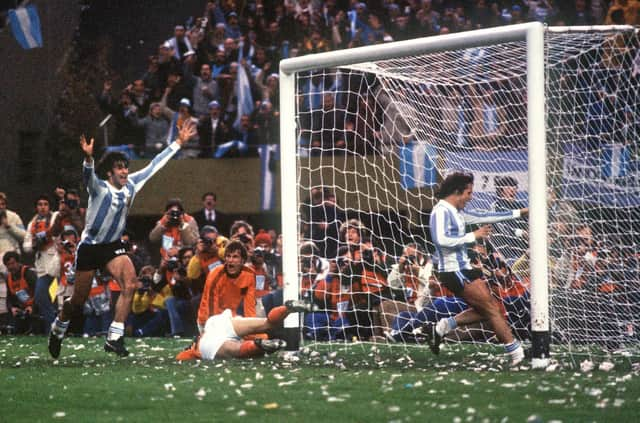Aidan Smith: Why it's Argentina for me - Acuna, De Paul, Romero, MacAllister of course and don’t forget Messi


I’d promised to meet up with my friend Heidi somewhere on her world travels and for me there was only ever going to be one rendezvous point – Argentina. I was desperate to see a game there.
Who wouldn’t be? Which Scotsman, after the black comedy of Ally MacLeod, didn’t want the 1978 World Cup’s host nation to triumph – entranced by Ossie Ardiles’ deedle-dawdle, Leopoldo Luque’s black eye and how he might have come by it, Daniel Passarella’s car-crusher tackling and above all Mario Kempes’ glistening thighs as he sashayed through the ticker-tape for another fabulous goal?
Advertisement
Hide AdAdvertisement
Hide AdFor who hadn’t fallen out of love with Brazil after the cloggy team of four years previously had soured the memory of Pele and Mexico 1970? And who didn’t subsequently love, for Argentina, Gabriel Batistuta and Juan Roman Riquelme and Fernando Redondo and above all Diego Maradona?
Finally, who, if you’re Scottish, has not examined the relationship and respective football personality traits of Argentina and Brazil and concluded: “That’s us and England!” Scotland and Argentina are the less successful, more argumentative neighbours, separated by Hadrian’s Wall and the Iguacu Falls. England’s Premier League is globally renowned and so are Brazil’s national team. Our football is less corporate, more chaotic, less brand, more bandito, and so is Argentina’s.
And there you have it: the first piece about today’s World Cup finalists which has gone this far before mentioning the name of Lionel Messi. I hereby claim the year’s supply of Quilmes beer.
I want Argentina to win. For Messi, of course. For the other guys in the team, the ones with the bad, brushed-forward hair and the bad skin. The unsung members which is pretty much everyone else in light blue and white stripes.
Each time they’ve played, leaving the commentators and pundits to drool about Messi, I’ve tried to study the contributions of the support-cast. First Rodrigo De Paul caught the eye with his relentless running; then Marcos Acuna, built in the classic Argentinian tradition like a road-compressor; then Cristian Romero with his cool pickpocketing interceptions at the back.
I want them to win for their incredible fans. This strange World Cup surrounded by desert owes them a huge debt. Revelations about paid cheerleaders and spies recruited to report back anti-Qatar sentiments had caused us to fear the worst regarding atmosphere. But upwards of 40,000 Argentinians have siphoned River Plate quantities of the stuff into the flatpack stadia, singing non-stop and often the same refrain throughout – the pop song “Muchachos, Ahora Nos Volvimos a Ilusionar” and its key line: “Boys, we have our hopes up again.”
I want them to win for all the World Cups after the Maradona-inspired victory of 1986 when they spontaneously combusted and campaigns were done down by drugs, kicking and slapstick defending.
I want them to win for two stupendous goals in 2006 – Maxi Rodriguez’ volley off the chest from the corner of the 18-yard box against Mexico and Esteban Cambiasso vs Serbia & Montenegro concluding a 24-pass move involving nine men, a sequence superior even to the one encased in Incas gold from ’70, the Carlos Alberto finale for Brazil. Your correspondent thrilled to both from German fanzones.
Advertisement
Hide AdAdvertisement
Hide AdI want them to win for the Scots pioneers of Argentinian football, including Alec Lamont who in 1891 founded the first football league to be established anywhere outside of Britain (won by an all-Scots team). Before Lamont in 1884 there was Alexander Watson Hutton, son of a Gorbals grocer and the real evangelist, who opened a school in Buenos Aires in which the game was central to the curriculum. And now? Well, what do you suppose the tenacious midfielder Alexis Mac Allister’s roots might be?
I even want them to win for that image of the team baiting the Netherlands after prevailing in the penalty shootout. There is no love lost between the countries and, like it or not though Argentina won’t much care, the still photograph is destined to be reproduced as often as the one of Maradona’s bamboozling of six Belgians from ’86.
And I also want them to win for that nerve-shredding day at El Monumental. The advice from Argentinians I met was: “Avoid eye contact, don’t wear a watch, leave your camera behind, only take enough of our useless pesos for a ticket and a fast taxi afterwards – but, really, you should be going with a local.” So would one of them come with me? “No way – too dangerous!”
The vast uncovered bowl is close to where the Gen. Jorge Videla’s military dictatorship tortured dissidents before they were bundled onto planes and dumped in the ocean. As soon as I arrived a gaggle of youths descended upon me, friendly at first, but then the pawing of the strange paleface turned to jostling. The first two fans I encountered who could speak English hurried me through the turnstiles.
I spent the entire match gripping the arms of my seat, staring straight ahead. Well, I actually made a sharp exit to beat the crush and missed the goals with which the club called River Plate beat Talleres 3-1, both scored by Ariel Ortega.
2002 was the 20th anniversary of the attempted reclaiming of the Falklands. A financial crisis – banks were besieged by customers demanding the return of their savings – ramped up tension on the streets where Union Jacks burned almost daily. What a time to be in “BA” and I wasn’t yet out of the woods, with my cabbie squinting at me in his rear-view mirror. “Ingles?” he asked. “Ah, Escoses!” he smiled when I put him right. “Si, si, mi amigo … ”
Comments
Want to join the conversation? Please or to comment on this article.